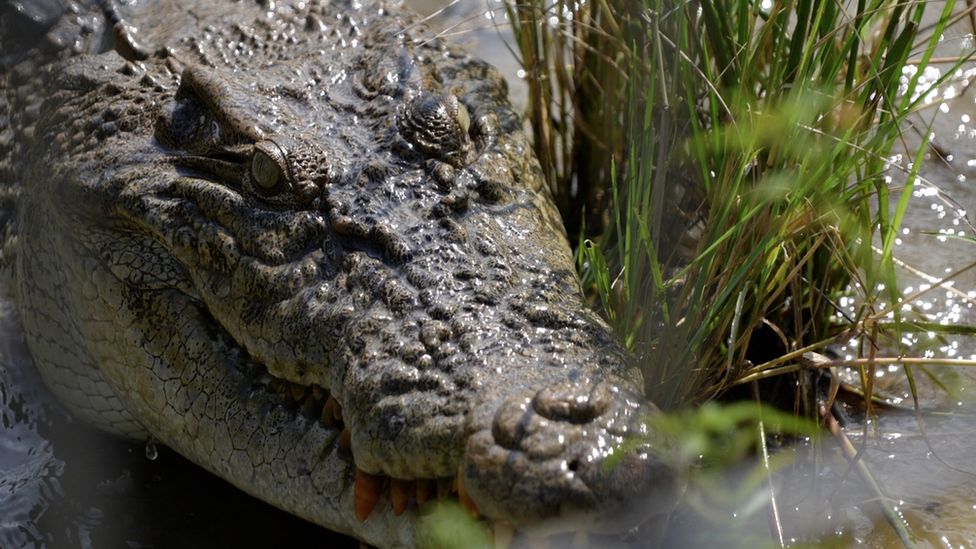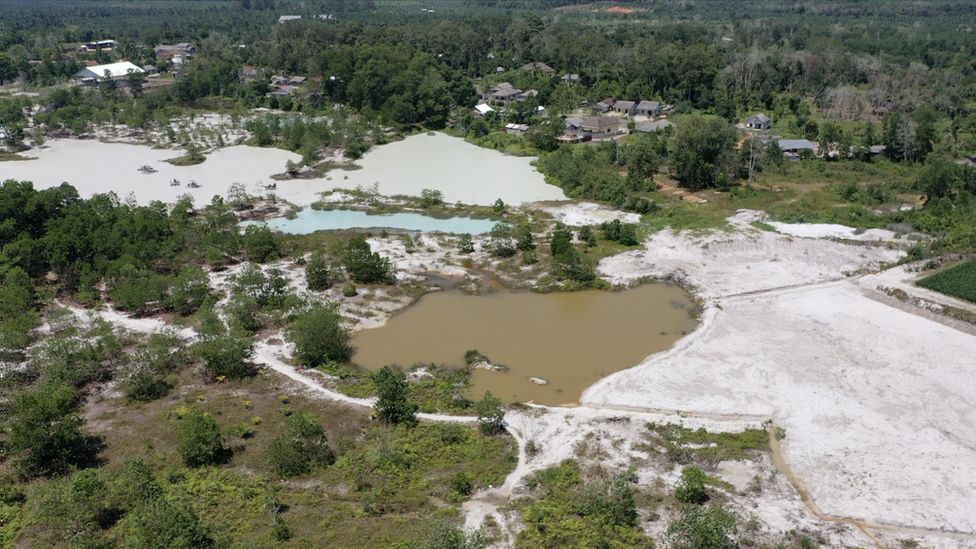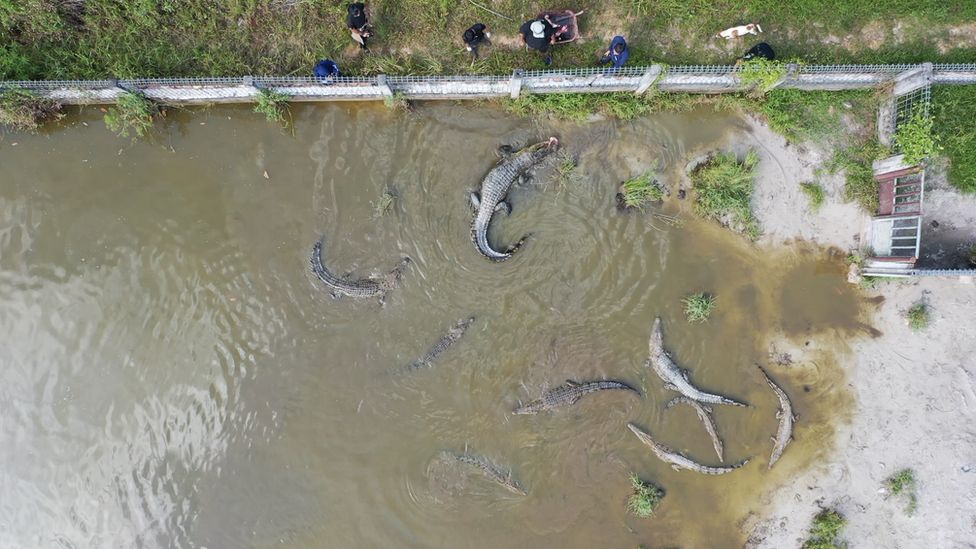Why Indonesia can’t stop crocodile attacks
 BBC / ANINDITA PRADANA
BBC / ANINDITA PRADANAWhen Sariah went to fetch water in a pit near her home in Bangka Island, Indonesia, last September, she was unaware that a 3m-long saltwater crocodile had been resting in the crater, watching as she filled one of her buckets.
"The water was calm and there was no sign of a crocodile, so I decided to take a bath. Suddenly, it appeared out of nowhere and bit me, dragging me by my left arm into the water," the 54-year-old says.
Indonesia sees the most saltwater crocodile attacks in the world. In the past decade, there have been about 1,000 attacks, killing more than 450 people. Nearly 90 of these attacks took place in Bangka and its neighbouring Belitung island, according to the International Union for Conservation of Nature (IUCN).
Bangka island is one of the richest tin-mining regions in the world.
The island - almost the size of Hawaii - has a population of one million, and about 80% of them are miners. More than 60% of the island's land has already been converted into tin mines, says wildlife conservation group Walhi. Many of these mines are illegal.
Decades of tin exploitation have stripped the island of its forest, leaving behind thousands of vast craters and pits that resemble a lunar landscape. And as land deposits diminish, miners are turning to the sea.
That means saltwater crocodiles, which can also live in freshwater, are squeezed out of their natural habitats. Now they are living in abandoned and active mining pits close to people's homes, contributing to the rise in attacks.
 BBC / ANINDITA PRADANA
BBC / ANINDITA PRADANALast year's prolonged dry season, driven by climate change, dried up the well in front of Sariah's house. Her water supply was cut after she fell behind on payments for three months. So, the abandoned pits were the only source of water for her family and many others.
Five days after the attack on Sariah, a miner in the island was almost killed by a crocodile when he was washing tin ore in another pit. He suffered injuries in his head, shoulder and an arm.
Ritual killings
The saltwater crocodile is the largest living reptile, and adult males can reach lengths of more than 7m (23ft). There are about 20,000 to 30,000 saltwater crocodiles worldwide, with Indonesia being one of the most important habitats. However, there are no official estimates of the number in Indonesia.
Crocodiles are a protected species in Indonesia, but in Bangka Island, they are usually killed after an attack - rather than being handed over to a local conservation agency.
Many locals believe that allowing the rescue of a crocodile to another location is a bad omen for the village, choosing instead to kill the animals and bury them in a ritual.
Endi Riadi, who runs Alobi, the only wildlife rescue and conservation centre in the island, says his team often argues with locals to try to save the crocodiles.
Founded in 2014, Alobi houses a variety of wildlife, including pangolins and crocodiles. These animals were either confiscated by officials in smuggling cases or captured after conflicts with humans.
There are 34 rescued crocodiles in Alobi, crammed in a pond half the size of a tennis court. An iron fence has been built to prevent them from wandering and attacking other animals.
Throughout most of the day, the water appears calm with several of the crocodiles seen floating like giant rocks. But during feeding time, they would race toward the edge, fighting for the chunks of beef thrown by the staff.
It is costly to keep all the crocodiles in the rescue centre, Mr Riadi says. Alobi doesn't receive direct government funding, and relies on donations. The sanctuary works together with cattle farmers in the area for more cost-effective meals to feed the toothy animals.
"Once a month we can get one whole cow to feed them. If the farmers have dead cattle, we feed it to them too," Mr Riadi says.
But he says it may not be possible for them to keep taking crocodiles back to the centre, which is already overcrowded. Letting them back out into the wild is also not an option.
 BBC / ANINDITA PRADANA
BBC / ANINDITA PRADANABut the attacks on humans will not stop unless the crocodiles' habitats are protected, and experts say illegal mining is the root of the problem. As people begin moving further out to sea in search of tin, more and more crocodiles will be forced out of their natural habitats.
The Indonesian government has taken an unusual approach to tackling illegal mining - by legalising it. The government allows miners to obtain a license to work in these illegal mines, but in exchange, they have to be responsible for habitat restoration, says Amir Syahbana, a local official overseeing energy and mineral resources.
This ranges from planting a tree to carrying out waste management. But many are sceptical about the strategy - questioning if miners will actually make any effort to restore the environment. Weak law enforcement on the island means they are likely to get away with it either way.
"Everyone here is a tin miner. They don't care about the environment," says Sariah, who has not returned to the pits ever since the attack. If her family runs out of water, other members volunteer to go.
She says she is lucky to be alive, but it still hurts when she moves her left hand or fingers.
"Sometimes when I sleep, the attack comes back to me in my dreams," she says.
No comments:
Post a Comment